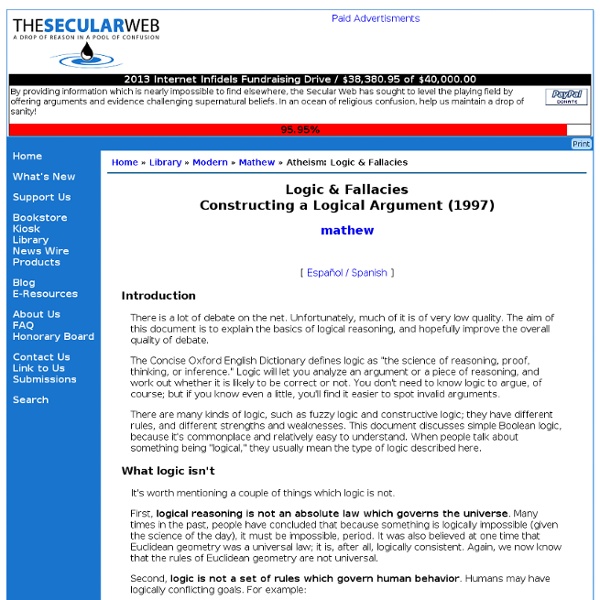The NESS » How To Argue
updated: June 2011 by Steven Novella, MD Arguing is one of those things most people do but few people do well. Many do not understand what a logical argument even is or how to do it correctly. Yet arguing is an essential skill of critical thinking. How we argue reflects how we think, how we evaluate our own conclusions, and how we challenge the beliefs of others. Even the very purpose of arguing is often misunderstood. The beauty of a logical argument is that it is, well… logical. Likewise, if two people have come to different conclusions about a factual claim, then one or both must be wrong. Keep in mind, this only works if the arguments are about factual claims, not subjective feelings or value judgments. An excellent example of this is the abortion debate. Structure of a Logical Argument Whether we are consciously aware of it or not, our arguments all follow a certain basic structure. Examine your Premises There are three types of potential problems with premises. Logical Fallacies
What is a logical fallacy?
A "fallacy" is a mistake, and a "logical" fallacy is a mistake in reasoning. There are, of course, other types of mistake than mistakes in reasoning. For instance, factual mistakes are sometimes referred to as "fallacies". However, The Fallacy Files is specifically concerned with logical errors, not factual ones. A logical error is a mistake in an argument, that is, a mistake in an instance of reasoning formulated in language. There are two types of mistake that can occur in arguments: A factual error in the premisses. In logic, the term "fallacy" is used in two related, but distinct ways. "Argumentum ad Hominem is a fallacy." In 1, what is called a "fallacy" is a type of argument, so that a "fallacy" in this sense is a type of mistaken reasoning. Clearly, these two senses are related: in 2, the argument may be called a "fallacy" because it is an instance of Argumentum ad Hominem, or some other type of fallacy. History Sources: Why study fallacies?
Fallacies
Dr. Michael C. Labossiere, the author of a Macintosh tutorial named Fallacy Tutorial Pro 3.0, has kindly agreed to allow the text of his work to appear on the Nizkor site, as a Nizkor Feature. It remains © Copyright 1995 Michael C. Other sites that list and explain fallacies include: Constructing a Logical Argument Description of Fallacies In order to understand what a fallacy is, one must understand what an argument is. There are two main types of arguments: deductive and inductive. A fallacy is, very generally, an error in reasoning.
Logical Fallacies
How to Disagree
March 2008 The web is turning writing into a conversation. Twenty years ago, writers wrote and readers read. The web lets readers respond, and increasingly they do—in comment threads, on forums, and in their own blog posts. Many who respond to something disagree with it. The result is there's a lot more disagreeing going on, especially measured by the word. If we're all going to be disagreeing more, we should be careful to do it well. DH0. This is the lowest form of disagreement, and probably also the most common. u r a fag!!!!!!!!!! But it's important to realize that more articulate name-calling has just as little weight. The author is a self-important dilettante. is really nothing more than a pretentious version of "u r a fag." DH1. An ad hominem attack is not quite as weak as mere name-calling. Of course he would say that. This wouldn't refute the author's argument, but it may at least be relevant to the case. DH2. DH3. This is often combined with DH2 statements, as in: DH4. DH5. DH6.
Logical Paradoxes
Fallacy List
1. FAULTY CAUSE: (post hoc ergo propter hoc) mistakes correlation or association for causation, by assuming that because one thing follows another it was caused by the other. example: A black cat crossed Babbs' path yesterday and, sure enough, she was involved in an automobile accident later that same afternoon. example: The introduction of sex education courses at the high school level has resulted in increased promiscuity among teens. A recent study revealed that the number of reported cases of STDs (sexually transmitted diseases) was significantly higher for high schools that offered courses in sex education than for high schools that did not. 2. SWEEPING GENERALIZATION: (dicto simpliciter) assumes that what is true of the whole will also be true of the part, or that what is true in most instances will be true in all instances. example: Muffin must be rich or have rich parents, because she belongs to ZXQ, and ZXQ is the richest sorority on campus. 3. 4. 5. 6. 7. 8. 9. 10. 11. 12. 13.



